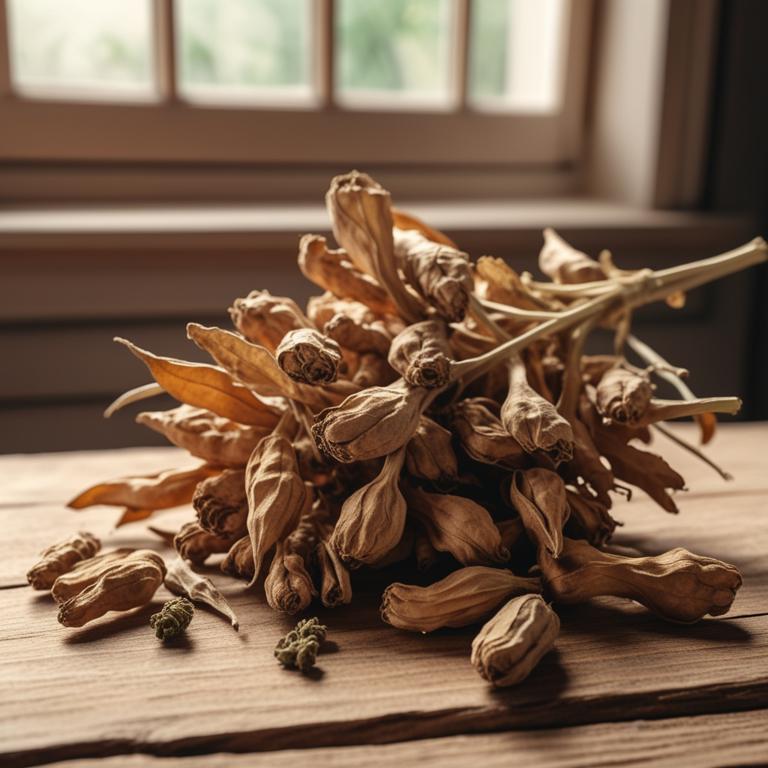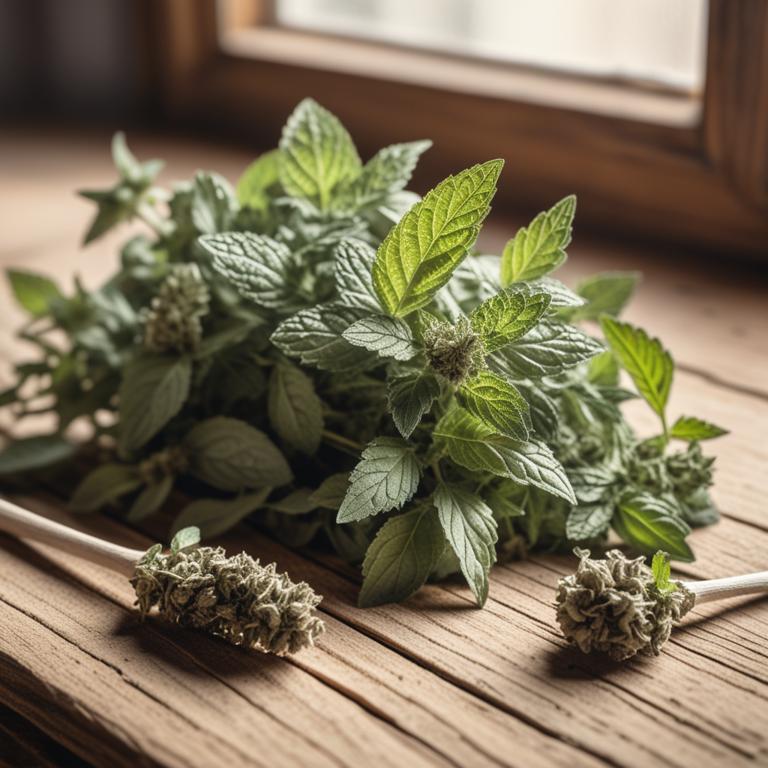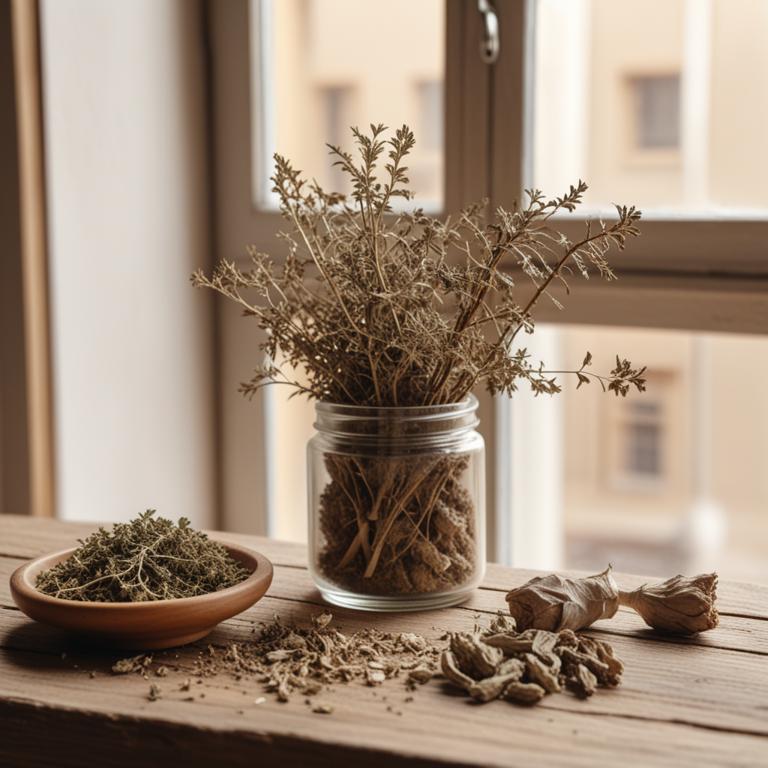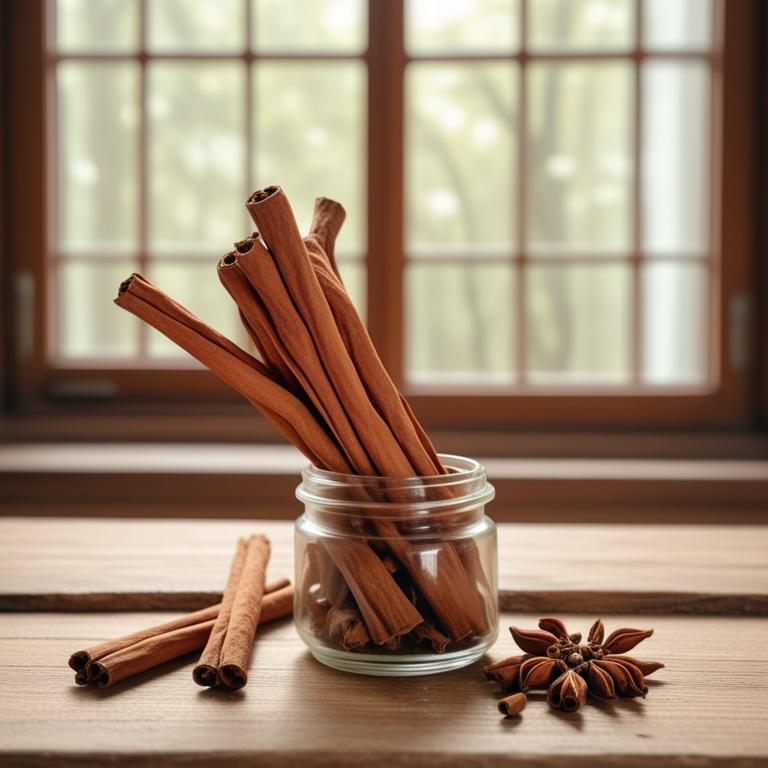Updated: Nov 30, 2024
7 Herbal Tinctures For Abdominal Pain

Herbal tinctures can be a great way to relieve abdominal pain.
These plant-based extracts contain active compounds that can help soothe and calm the digestive system. For example, Zingiber officinale, also known as ginger, has anti-inflammatory properties that can help reduce pain and inflammation in the abdomen. Curcuma longa, or turmeric, contains a compound called curcumin, which has potent anti-inflammatory and antioxidant properties that can help ease abdominal pain and reduce inflammation.
Glycyrrhiza glabra, or licorice root, has anti-inflammatory properties that can help soothe the digestive system and reduce pain. When taken as a tincture, these herbs can be absorbed quickly into the body, providing fast relief from abdominal pain. This can be especially helpful for people who experience frequent or severe abdominal pain, as it can help them manage their symptoms and improve their quality of life.
By using herbal tinctures, people can take control of their digestive health and find natural relief from abdominal pain.
This article explains in detail what are the best herbal teas for abdominal pain and wh.
Also, you may be interested in...
Today Free Bonus!
The Ultimate Herb Drying Checklist
(For Long-Lasting Powerful Medicinal Effect)
How to easily dry herbs that don't mold and that keep their strong medicinal power for more than 1 year.
Table of Contents
1. Zingiber officinale

Zingiber officinale tinctures contains the bioactive constituents of ginger, including gingerols and shogaols.
These compounds have anti-inflammatory and analgesic properties, which help to reduce inflammation and ease pain in the abdominal region. The warming and relaxing effect of ginger tinctures can also help to soothe digestive issues, such as bloating and cramps. Ginger's ability to inhibit the production of prostaglandins, hormone-like substances that cause pain and inflammation, contributes to its effectiveness in alleviating abdominal pain.
By reducing inflammation and relaxing the abdominal muscles, ginger tinctures can provide relief from abdominal pain and discomfort.
- Gather 250g of fresh Ginger root and 1 cup of 80% ethanol or vodka in a clean glass jar.
- Chop the Ginger root into small pieces and pack them into the jar, leaving 1 inch at the top.
- Pour the ethanol or vodka over the Ginger root until it's completely covered. Make sure the liquid is at least 2 inches above the root.
- Close the jar and let it sit in a cool, dark place for 2-3 weeks, shaking the jar every day. This will help the Ginger extract into the liquid.
- After 2-3 weeks, strain the liquid through a cheesecloth or a coffee filter into another clean glass bottle. Discard the solids and store the tincture in a cool, dark place.
2. Curcuma longa

Curcuma longa tinctures contains a high concentration of curcuminoids, particularly curcumin, demethoxycurcumin, and bisdemethoxycurcumin.
These curcuminoids have potent anti-inflammatory and antioxidant properties, which help to reduce inflammation and oxidative stress in the abdominal area. The curcuminoids also have a direct effect on the body's pain-sensing mechanisms, blocking the production of pain-causing chemicals like prostaglandins and bradykinin. Curcuma longa tinctures have been shown to relax the smooth muscle in the digestive tract, reducing spasms and cramping that can cause abdominal pain.
By reducing inflammation and relaxing the digestive tract, curcuma longa tinctures can provide relief from abdominal pain and discomfort.
- Gather 1 cup of dried Curcuma longa root, 2 cups of 80% ethanol or vodka, and a clean glass jar with a lid.
- Combine the dried root and ethanol in the jar, making sure the root is fully covered.
- Seal the jar and let it sit in a cool, dark place for 2-3 weeks, shaking the jar every day.
- After 2-3 weeks, strain the mixture through a cheesecloth or a coffee filter into another clean glass jar, discarding the root.
- Store the tincture in a cool, dark place and take 10-20 drops as needed for abdominal pain relief, mixing with water if desired.
3. Glycyrrhiza glabra

Glycyrrhiza glabra tinctures contains compounds like glycyrrhizin and flavonoids that make it effective for abdominal pain.
Glycyrrhizin has anti-inflammatory properties, which help reduce swelling and pain in the abdominal area. The flavonoids, including isoflavones and phenolic acids, have antioxidant properties that help protect the digestive system from damage. These compounds also have a soothing effect on the digestive tract, which can help alleviate cramps and discomfort associated with abdominal pain.
By reducing inflammation and promoting a healthy digestive system, Glycyrrhiza glabra tinctures can help alleviate abdominal pain and discomfort.
- Gather 1 cup of dried Glycyrrhiza glabra root and 2 cups of 80% ethanol (vodka or rum work too).
- Combine the dried root and ethanol in a clean glass jar. Stir well to coat the root evenly.
- Seal the jar and let it sit in a cool, dark place for 2-3 weeks. Shake the jar daily.
- After 2-3 weeks, strain the liquid through a cheesecloth or a coffee filter into another clean glass jar. Discard the solids.
- Transfer the tincture to a dark glass bottle and store it in a cool, dark place. Use 10-20 drops, 3-4 times a day, for abdominal pain relief.
4. Foeniculum vulgare
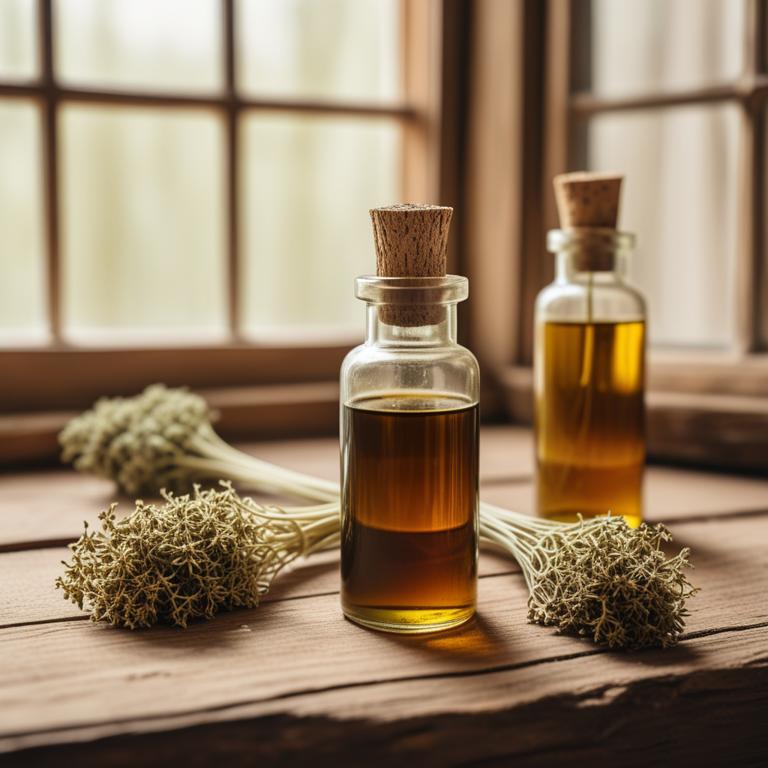
Foeniculum vulgare tinctures contains a compound called apigenin, which is known for its anti-inflammatory properties.
The tincture also contains another compound called limonene, which has been shown to relax the muscles in the digestive tract. The essential oils present in the tincture, such as anethole and fenchone, have a calming effect on the stomach and intestines, reducing cramps and spasms. These compounds work together to help alleviate abdominal pain by reducing inflammation and relaxing the muscles in the digestive system.
By using Foeniculum vulgare tinctures, some people have found relief from abdominal pain and discomfort.
- Gather 1 cup of Foeniculum vulgare roots and flowers. Clean them well.
- Combine the roots and flowers in a glass jar. Add 2 cups of vodka or 80% ethanol.
- Seal the jar tightly and store it in a cool, dark place for 2-3 weeks. Shake the jar daily.
- Strain the mixture through a cheesecloth or a coffee filter into another jar. Discard the solids.
- Label the jar with the date and the name of the tincture. Store it in a cool, dark place. Use 20-30 drops in water as needed for abdominal pain.
5. Cinchona officinalis

Cinchona officinalis tinctures contains compounds like quinine and alkaloids that help with abdominal pain.
These alkaloids, including quinidine and cinchonine, have anti-inflammatory properties that reduce swelling and ease pain. Quinine, in particular, has antispasmodic properties that help relax the muscles in the digestive tract, which can become inflamed and cause cramps. The antiseptic properties of quinidine also help kill bacteria that can cause infections and worsen abdominal pain.
By reducing inflammation and killing bacteria, Cinchona officinalis tinctures can provide relief from abdominal pain.
- Gather ingredients: 1 cup of Cinchona officinalis leaves, 2 cups of vodka (95% or higher), and a clean glass jar with a lid.
- Add the Cinchona officinalis leaves to the glass jar, covering them completely with vodka.
- Close the jar and shake it well for 2-3 minutes to mix the ingredients.
- Store the jar in a cool, dark place for 2-3 weeks, shaking it every day to help the tincture extract from the leaves.
- Strain the tincture through a cheesecloth or a coffee filter into another clean glass bottle, discarding the leaves. Use 10-20 drops of the tincture in water for abdominal pain relief.
6. Panax ginseng
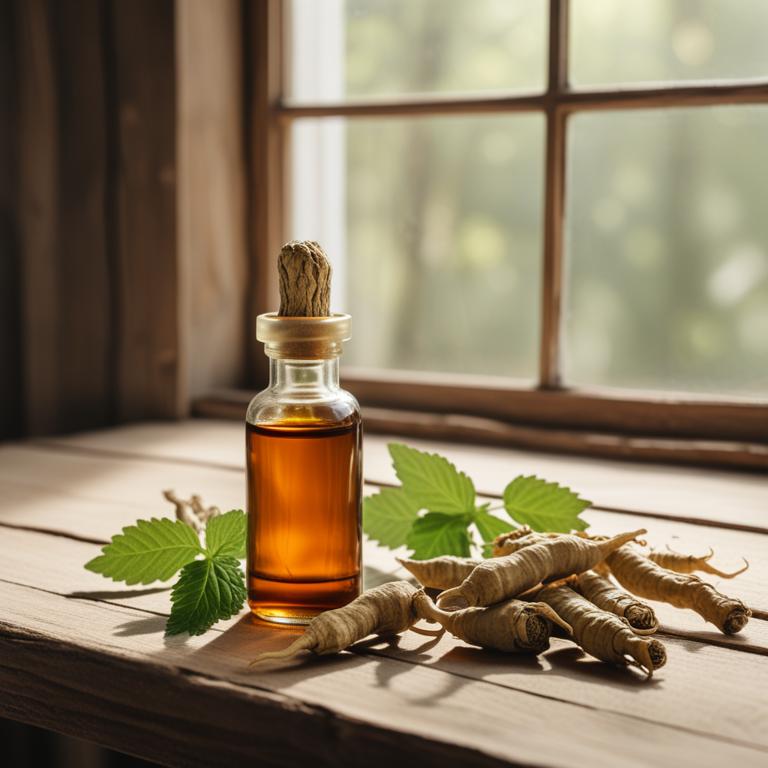
Panax ginseng tinctures contains ginsenosides and other bioactive compounds like ginsenoside Rb1, ginsenoside Rg1, and ginsenoside Re.
These compounds have anti-inflammatory properties that help reduce swelling and inflammation in the abdominal area, which can contribute to abdominal pain. The ginsenosides also have antioxidant properties that protect cells from damage and promote healing. Additionally, Panax ginseng tinctures contain eleutheroside E, which has analgesic properties that can help relieve pain.
By reducing inflammation, promoting healing, and relieving pain, Panax ginseng tinctures may help alleviate abdominal pain.
- Gather 100g of dried Panax ginseng roots, 1 cup of vodka, and a glass jar with a lid.
- Cut the ginseng roots into small pieces and put them in the glass jar.
- Pour 1 cup of vodka over the ginseng roots, making sure they are completely covered.
- Close the jar and let it sit in a cool, dark place for 2-3 weeks, shaking the jar every day.
- Strain the liquid through a cheesecloth or a coffee filter into another glass bottle, discarding the solids. Use 20-30 drops of the tincture as needed to relieve abdominal pain.
7. Ginkgo biloba

Ginkgo biloba tinctures contains flavonoids and terpenoids as its active constituents.
These flavonoids, including quercetin and kaempferol, have antioxidant and anti-inflammatory properties. Terpenoids, such as bilobalide and ginkgolides, also have anti-inflammatory and vasodilatory effects. By reducing inflammation and improving blood flow to the abdominal area, Ginkgo biloba tinctures may help alleviate abdominal pain.
The combined effects of these compounds help to relax the smooth muscles and reduce spasms in the abdominal region.
- Gather 1 cup of fresh or dried Ginkgo biloba leaves, 2 cups of vodka, and a glass jar with a lid.
- Combine the Ginkgo biloba leaves and vodka in the glass jar. Stir well to coat the leaves.
- Seal the jar and let it sit in a cool, dark place for 2-3 weeks, shaking the jar every day.
- Strain the liquid through a cheesecloth or a coffee filter into another glass jar. Discard the solids.
- Store the Ginkgo biloba tincture in the fridge and take 20-30 drops, 2-3 times a day, as needed to relieve abdominal pain.
FAQ
Can drinking herbal tea prevent abdominal pain from forming?
Drinking herbal tea may help with abdominal pain.
Peppermint tea, for example, can calm the stomach and reduce cramps. Ginger tea also has anti-inflammatory properties that can soothe the digestive system.
These teas work by relaxing the muscles and reducing inflammation, which may help ease abdominal pain.
Is it safe to consume herbal teas for abdominal pain every day?
Consuming herbal teas for abdominal pain every day can be safe, but it depends on the tea.
Some teas, like peppermint, may help soothe the stomach. Others, like chamomile, can be calming. However, some teas might interact with medications or worsen underlying conditions.
It's essential to choose a tea that's safe for you.
How long does it take for herbal teas to show results in abdominal pain?
Herbal teas can provide relief from abdominal pain within a few hours to a few days.
Ginger tea is often effective within a few hours, while peppermint tea may take a bit longer, sometimes up to 24 hours.
The exact timing depends on the individual and the specific tea being used.
What time of day is best to drink herbal tea for abdominal pain?
If you're experiencing abdominal pain, try drinking herbal tea in the morning or early afternoon.
These times might help calm your stomach before meals or digestion issues.
Some herbal teas, like peppermint and chamomile, can ease discomfort and help you feel better.
Related Articles
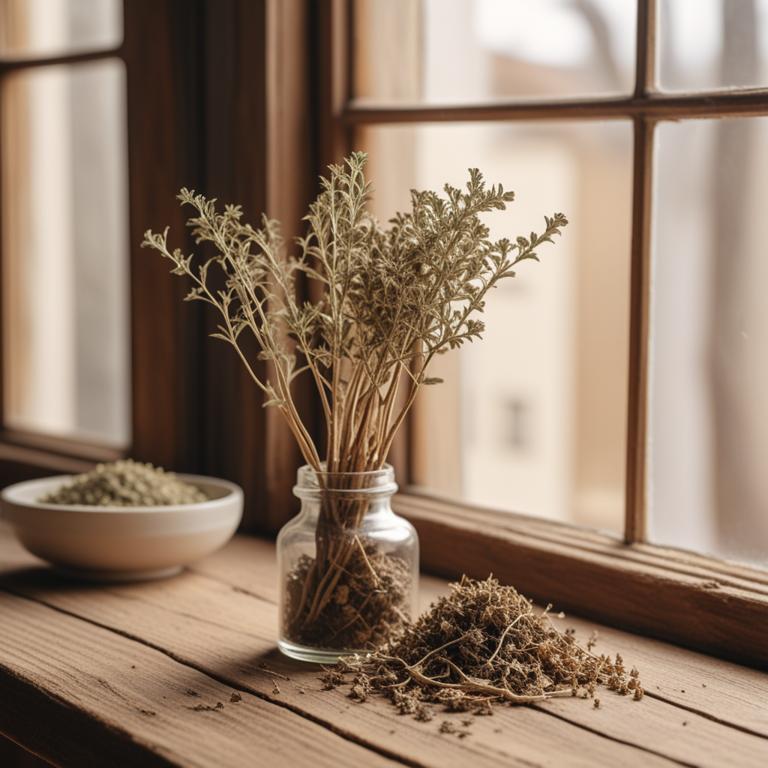
Understanding Abdominal Pain Causes and Herbal Solutions
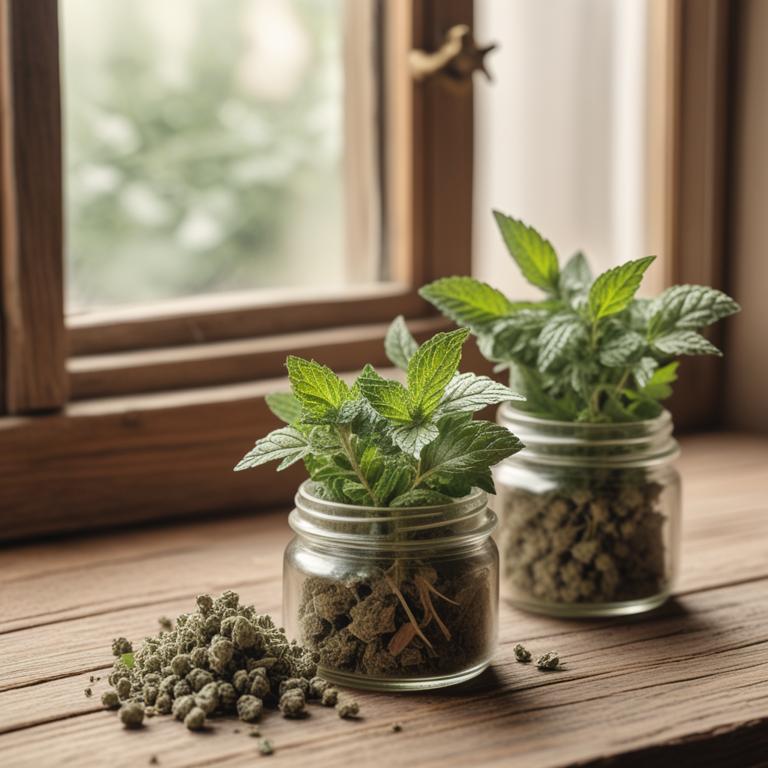
Painful Swallowing: Causes, Medicinal Herbs, and Alternative Preparations for Comfort
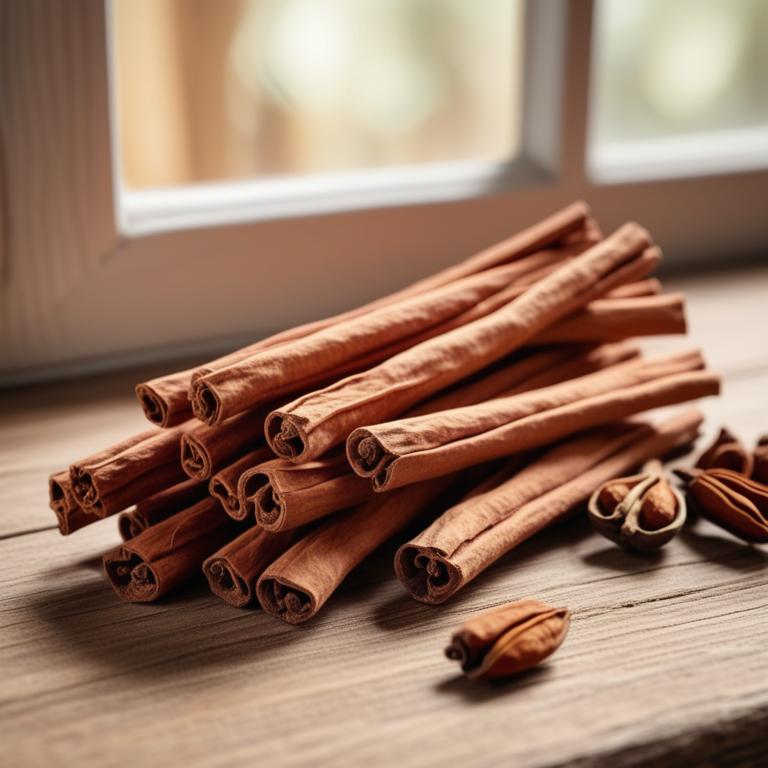
Morning Sickness: A Guide to Causes and Herbal Preparations
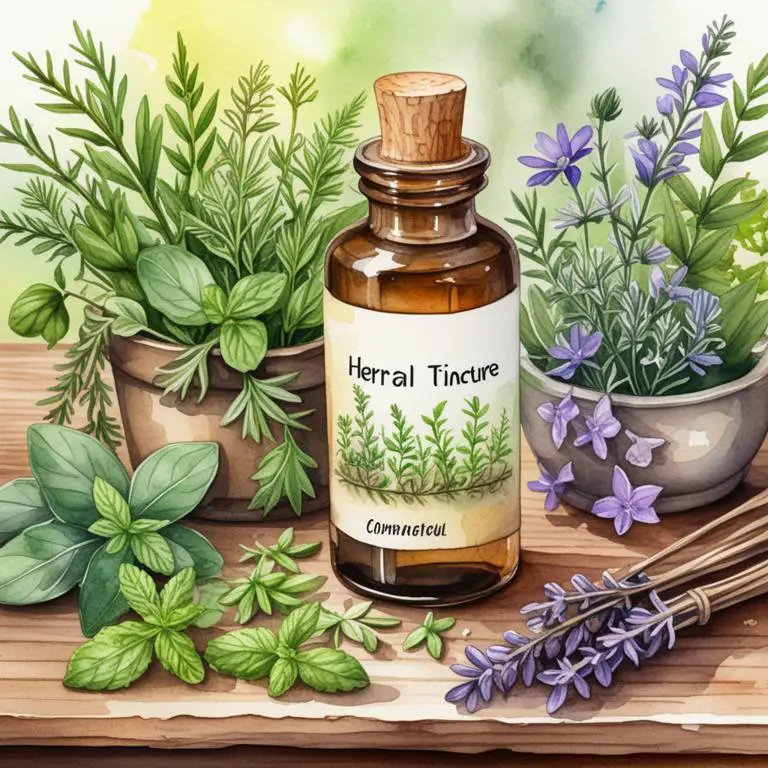
Unlocking the Secrets of Difficulty Eating: Medicinal Herbs and Herbal Preparations for a Balanced Diet
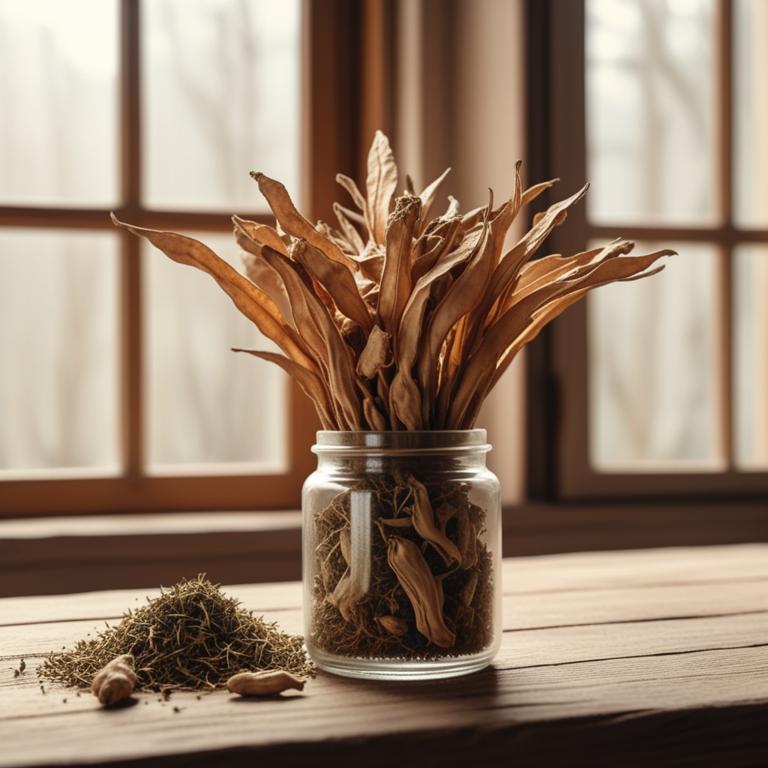
Overcoming Bitter Taste in Mouth: Natural Causes and Herbal Remedies
